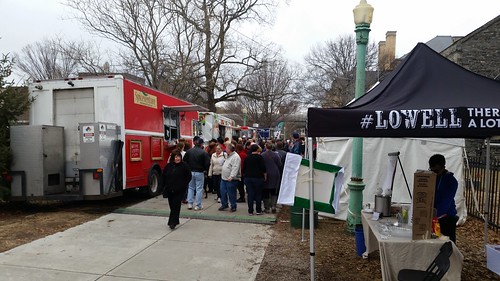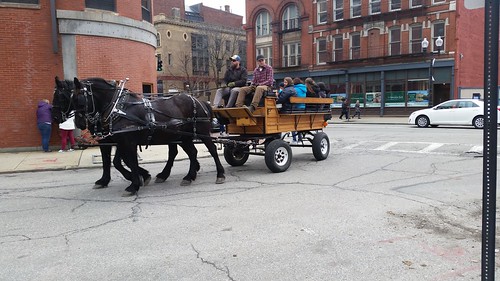Lowell Week in Review: February 25, 2018
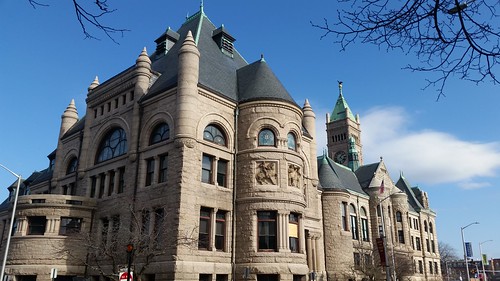
Pollard Memorial Library update
The long awaited re-opening of the Pollard Memorial Library will HOPEFULLY take place this Wednesday. Closed since a burst pipe flooded the place during an early January freeze, the damage has been repaired. The library is the hub of literary, cultural and educational events for people of all ages in Lowell and its closure has left a hole in our community.
If you’re not a regular library patron, a great reason to visit comes on Saturday, March 10, 2018 with the first On the Road marathon reading. Celebrating the 96th birthday of Lowell author Jack Kerouac, volunteers will read aloud his classic novel, On the Road, from start to finish. Check out the On the Road Marathon home page for the schedule and to sign up to be a volunteer reader. There are plenty of openings in the post 8pm reading slots.
No City Council Meeting Last Week
The city council cancelled its February 20, 2018 meeting so it was a relatively quiet week in Lowell politics. The council will next meet this coming Tuesday. Mimi Parseghian will have her council meeting preview tomorrow. One of the first items on the agenda is a discussion of the procedure to be followed to hire the next city manager. In last Sunday’s Week in Review, I wrote about how the council handled that task back in 2014 when it hired Kevin Murphy.
Because it was a relatively quiet week in Lowell politics, the rest of today’s post will focus on some upcoming events that are not primarily political, although everything in Lowell does involve politics in some way.
Citizen Jane: Battle for the City
How do we solve Lowell’s traffic woes? Do we need wider streets and bridges, or more sidewalks, bike lanes and buses? Is there insufficient parking in downtown, or too much? Should further residential development be excluded from downtown, particularly the Hamilton Canal District, or do we need more mixed-use developments throughout the city?
If you have an opinion on any of those questions, please come to Lowell National Historical Park visitor center at 246 Market Street this Tuesday night, February 27, 2018 at 6:30 pm, for a screening of Citizen Jane: Battle for the City, a documentary about Jane Jacobs, an urban activist who led a number of fights to preserve neighborhoods in New York City. Immediately after the film I will lead a discussion on how the themes of the film apply to Lowell today. The film is presented by the Lowell Parks & Conservation Trust and the Lowell Film Collaborative.
And a reminder who those who rely on my Tuesday night Lowell City Council meeting notes, that posting will be delayed for a day or two since I won’t be able to watch the council meeting live due to the Citizen Jane event.
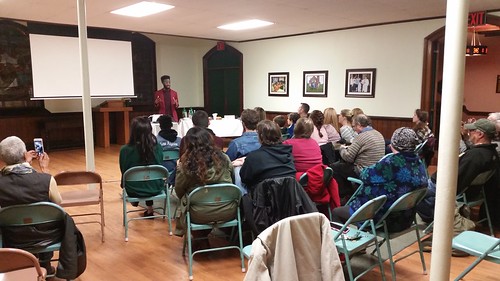
Filmmaker Raysam Donhoh-Halm speaking with audience at Eliot Church Library Gallery
Days of Division
Another Lowell-connected film premiered last week at the Eliot Church Library Gallery at 273 Summer Street. Days of Division is a 35-minute documentary on the debate over the location of Lowell High School that took place in the city last year. Immediately following the movie, Raysam Donkoh-Halm, a Dracut resident who, along with his family, has been intimately involved in Lowell for years, led a talk-back session with audience members, many of whom had been featured in the film. The movie is an amazing piece of work by Donkoh-Halm, who produced it as part of a college film class.
After seeing the film, several audience members who played central roles in the high school debate stated that reliving the debate through the film rekindled powerful emotions that had eased somewhat since the November election.
Another audience member, who was neither in the film nor, as far as I know, overtly involved in the debate one way or another, said that the film presented at least two contradictions. The first involved the Belvidere neighborhood. The pro-downtown group claimed that the initial council vote to move the school to Cawley was driven by the powerful Belvidere neighborhood which wanted the school to be more conveniently located for their own children; while the pro-Cawley group claimed that the election and referendum results in favor of downtown were driven by the powerful Belvidere neighborhood which did not want kids from other parts of the city coming to their neighborhood to attend high school.
The same film-goer offered a similar contradiction about downtown: Cawley supporters argued that downtown was a dangerous, threatening place. That assertion was a major reason for moving the school out of downtown. Yet when asked what would take the place of the school, the same people presented a rosy vision of the future of downtown with upscale stores, condominiums and people once the high school was gone.
One thing that most people in attendance agreed upon was that social media did not play a helpful role in this debate.
If anyone wishes to see Days of Division, it will be shown on March 15, 2018 at 7 pm at the Ayer Lofts Art Gallery as part of the ongoing “Collage of a City” photography and poetry exhibit. Seating is limited in the gallery, so please RSVP via the event Facebook page.
Also, please keep your eyes on the Eliot Church Library Gallery which is a new exhibition space in one of Lowell’s most historical buildings, the Eliot Church. A new exhibit, Images of Haiti: Through the Canvas and the Lens, by Laurae Richards and Elijah Richards, will have an opening reception on Sunday, March 4, at 11:30 am.
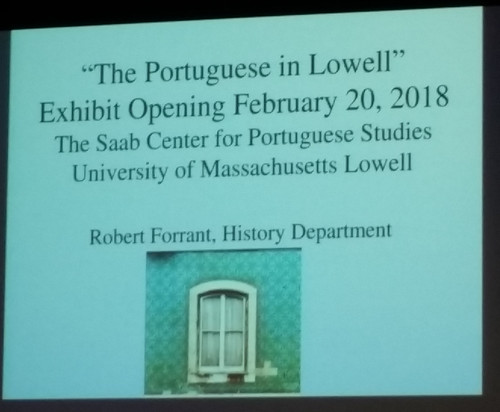
The Portuguese in Lowell
Continuing with today’s cultural theme, this past Monday, February 20, 2018, was the opening of “The Portuguese in Lowell” exhibit at UMass Lowell’s University Crossing at 220 Pawtucket Street. The exhibit, which consists of a dozen panels of photos and text, depicts the experience of the Portuguese people of Lowell. It will remain open for public viewing on the second floor of University Crossing through March 30, 2018.
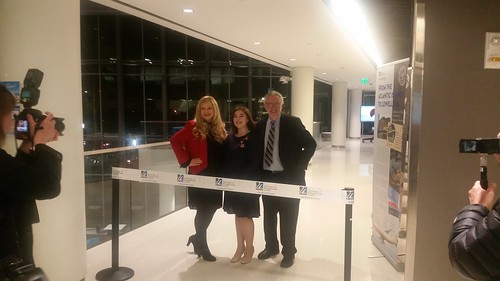
Katie Phelps, Molly Mahoney and Bob Forrant – creators of the Portuguese in Lowell exhibit.
Monday’s opening featured a reception and an academic lecture by UMass Lowell History Professor Bob Forrant who supervised Molly Mahoney and Katie Phelps, the two UMass Lowell students who conducted the research for the exhibit.
The event began with introductory remarks by Luis M. Falcon, the dean of the College of Fine Arts, Humanities and Social Sciences. Dean Falcon explained that after the explosive growth of UMass Lowell in the past decade, the school is striving to reconnect with the community around it. Exhibits like this, which was sponsored by the Saab Center for Portuguese Studies, are a big part of that effort.
Following Dean Falcon, UMass Lowell Chancellor Jacquie Moloney introduced Professor Forrant. She said that with so much debate today in America about the place of immigration in our society, this exhibit is both timely and important in that it demonstrates the important contribution of the Portuguese people to Lowell. The exhibit is equally important in that it demonstrates to today’s students, many of whom are immigrants, that there is a history of immigrants being welcomed to and succeeding in Lowell which will give them hope for their future here.
The title of Bob’s talk was “Mills Calling: Portuguese Immigrants Make a Life and a Living in Lowell, Mass.” The Portuguese began arriving in Lowell in the 1890s to work in the mills. They were part of the great influx of immigrants to America from the 1880s to the 1920s. As historian Oscar Handlin put it, the history of immigration is the history of America. So many Portuguese people came to this region to work in the mills that by 1916, the Portuguese were the third largest immigrant group working in the mills of New England after the French Canadians and Polish.
Things changed with the Immigration Act of 1924. This established a quota system that limited the annual number of immigrants from a particular country to 2 percent of the number of people from that country who were already living in the United States according to the 1890 census. Since very few people from the Mediterranean and Eastern Europe were in America by 1890, the 1924 Act severely restricted the number of people coming to America from countries like Portugal.
At about the same time, the mills of Lowell were beginning to fail. Many people who had come to Lowell from overseas scattered to follow work. Many of them, up to 31 percent who had immigrated here, returned to Portugal.
This situation persisted until Congress passed the Immigration Act of 1965 which abolished the quota system which had heavily favored northern European immigrants. The new act kept quotas, but racial and national barriers were mostly removed. This opened the door to a second wave of Portuguese immigrants, many from Faial and other islands of the Azores.
Bob closed his remarks by citing examples of community activism by Portuguese people of Lowell, from leading the massive strike against the mills in 1912 to playing an important role in blocking the extension of the Lowell Connector through the Back Central neighborhood in the 1960s.
Eric Foner in Lowell
On March 22, 2018, Pulitzer Prize winning historian Eric Foner, a professor of history at Columbia University and the author of more than two dozen books on slavery, the Civil War and Reconstruction, will speak at UMass Lowell’s Weed Hall at 7 pm. The title of Professor Foner’s talk is “The Second Founding: How the Civil War and Reconstruction Changed the Constitution.” The lecture is open to the public, however, there is a $5 fee.
A pre-lecture reception for Professor Foner will begin at 5:30 pm at UMass Lowell’s Allen House. The cost for the reception and the lecture is $65 per person. A portion of the proceeds will go to the Doris Kearns Goodwin and Richard Goodwin Scholarship Fund at the University. Tickets are available online from UMass Lowell.
I’m just finishing Ron Chernow’s fascinating new biography of Ulysses S. Grant. The book lays out Grant’s Civil War accomplishments clearly and concisely, but the true value of the book to me was its extensive coverage of the role taken by Grant as President to enforce the rights of the recently freed slaves in the American south after the war. Many of us have been tainted by a century of revisionist history by pro-southern historians who belittled Reconstruction. Chernow argues quite the contrary: that Reconstruction was a noble effort to grant equal rights to African-Americans who were formerly held as slaves, but that southern violence against those who exerted such equality and northern ambivalence, born in large part by embedded racism, caused the collapse of reconstruction. It also set back the cause of African-American equality for nearly a century until the Civil Rights legislation of the mid-1960s. Anyone with open eyes can see that the struggle continues today.
And because everything in history always relates back to Lowell somehow, Chernow gives ample coverage to Lowell’s Ben Butler, both as a Civil War general and as a Reconstruction era politician, and to Butler’s son-in-law, Adelbert Ames, a recipient of the Congressional Medal of Honor during the Civil War and the Reconstruction-era governor of Mississippi during the Grant administration.
Chernow’s book is excellent, but the foremost authority in America on this topic is Eric Foner. He’ll be here in Lowell on March 22. Please make an effort to hear him speak.
Ben Butler’s Birthday
Speaking of Ben Butler, November 5, 2018 would be his 200th birthday. Lowell cannot let that day pass unrecognized, so efforts are underway to organize an event honoring and commemorating Butler, not only for his service during the Civil War but also for his post Civil War efforts as a champion of labor. If you are interested in helping with this event, please get in touch with me.
Lowell Walks 2018
Planning for Lowell Walks 2018 is well underway and the schedule of summertime walks will be announced in the next few weeks. One new thing we will try this year is “flash tours” which will be walking tours given on relatively short notice – say 48 hours. Our usual tours begin at 10 am on Saturdays from the National Park Visitor Center. Because they will be created on short notice, the upcoming flash tours will start on different days, at different times, and from different places. To get notice of these tours and all other Lowell walking tours, please sign up for the Lowell Walks email newsletter by entering your email address in the box on the upper right of this page.
For now, here are a couple of tours that have been scheduled:
City Hall Monuments walking tour. Saturday, April 28, 2018 at 1pm from NPS Visitor Center, repeated on Sunday, April 29, 2018, same time and place. This free 90 minute walking tour will explore the many monuments on the grounds of Lowell City Hall and in the immediate vicinity. These tours will be part of the inaugural Lowell ArtsWeek festival which will last through May 6.
Lowell Cemetery Tours. The spring tours of Lowell Cemetery will take place on Friday, May 11, 2018 at 1 pm; and on Saturday, May 12, 2018 at 10 am. These tours will both begin at the cemetery’s Lawrence Street Gate. The tours are free, require no advance registration, and last about 90 minutes. Ample parking is available within the cemetery.
Other Upcoming Events
Irish Cultural Week kicks off next Sunday, March 4, 2018, with the opening Mass at St. Patrick’s Church followed by the Irish Cultural Week parade and a brunch at St. Patrick’s Church Hall. Check out the Lowell Irish website for the full schedule for Irish Cultural Week.
On Sunday, March 11, 2018, from 11 am to 2 pm at the Ayer Lofts Art Gallery at 172 Middle St, Aloysius Productions will host an opening reception of its Collage of a City Photo exhibit that features “street-level” photos of the city’s history and culture. This event will also feature continuous readings by more than a dozen writers, poets and songwriters. See the event Facebook page for more info.
On Saturday, March 24, 2018 at 2 pm at the Mogan Cultural Center, Lowell National Historical Park will host the opening reception for a new “Branding Lowell” exhibit, which combines history and artwork to display various logos used by the city of Lowell, its companies and community organizations through the years. The exhibit will be open throughout the spring and summer.
Winterfest 2018
Thanks to everyone who made Winterfest 2018 possible. There was a great crowd downtown through the afternoon on Saturday. Below are some photos from the festival:

